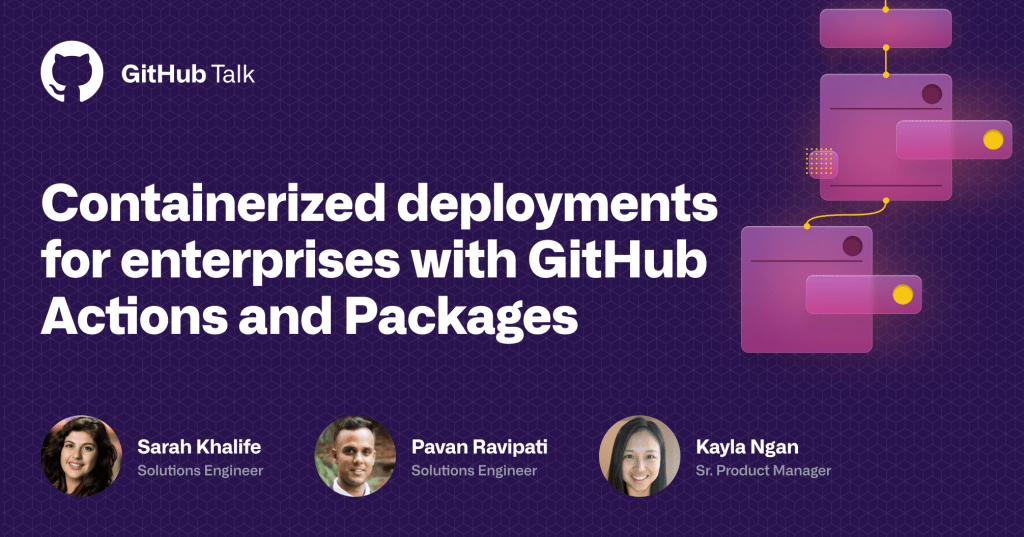How to get your organization started with containerized deployments
This is our second post on cloud deployment with containers. Looking for more? Join our upcoming GitHub Actions webcast with Sarah, Solutions Engineer Pavan Ravipati, and Senior Product Manager Kayla…

This is our second post on cloud deployment with containers. Looking for more? Join our upcoming GitHub Actions webcast with Sarah, Solutions Engineer Pavan Ravipati, and Senior Product Manager Kayla Ngan on October 22.
In the past few years, businesses have moved towards cloud-native operating models to help streamline operations and move away from costly infrastructure. When running applications in dynamic environments with Docker, Kubernetes, and other tooling, a container becomes the tool of choice as a consistent, atomic unit of packaging, deployment, and application management. This sounds straightforward: build a new application, package it into containers, and scale elastically across the infrastructure of your choice. Then you can automatically update with new images as needed and focus more on solving problems for your end users and customers.
However, organizations don’t work in vacuums. They’re part of a larger ecosystem of customers, partners, and open source communities, with unique cultures, existing processes, applications, and tooling investments in place. This adds new challenges and complexity for adopting cloud native tools such as containers, Kubernetes, and other container schedulers.
Challenges for adopting container-based strategies in organizations
At GitHub, we’re fortunate to work with many customers on their container and DevOps strategy. When it comes to adopting containers, there are a few consistent challenges we see across organizations.
- Containerizing and maintaining applications: Most organizations have existing applications and need to make the decision about whether to keep them as-is, or to place them in containers for an easier transition to the cloud. Even then, teams need to determine whether a single container for the application is appropriate (in a lift-and-shift motion to the cloud), or if more extensive work is needed to break it down into multiple services, delivered as a set of containers.
- Efficiently configuring and managing permissions: Adopting containers often translates to better collaboration for everyone in your organization. DevOps is now more than just core developers and IT operators. It includes release and infosec engineers, data scientists, QA, project managers, and other roles. But collaborating across multiple teams introduces new needs for configuring and managing permissions for code, along with the automation to support it.
- Standardizing best practices across the organization: Containers help teams scale and integrate quickly, but may also require updating your CI/CD practices to match. You have to validate they work well for existing applications, while incorporating the correct user and package permissions and policies.. The best practices you set have to be flexible for others too. Individual teams—who are transitioning to new ways of working—need to be able to optimize for their own goals.
Connecting teams and cloud-native tools with GitHub
Despite the few challenges of adopting containers and leveraging Kubernetes, more and more organizations continue to use them. Stepping over those hurdles allows enterprises to automate and streamline their operations, here with a few examples of how enterprises make it work successfully with support from package managers and CI/CD tools. At GitHub, we’ve introduced container support in GitHub Packages, CI/CD through GitHub Actions, and partnered within the ecosystem to simplify cloud-native workflows. Finding the right container tools should mean less work, not more—easily integrating alongside other tools, projects, and processes your organization already uses.
See container best practices in action

Want to simplify container deployments in your organization? Join me, Solutions Engineer Pavan Ravipati, and Senior Product Manager Kayla Ngan on October 22 to learn more about successfully adopting containers. We’ll walk through how to use them in the real world and demo best practices for deploying an application to Azure with GitHub Container Registry.
When
October 22, 2020
11:00 am PT / 2:00 pm ET
Watch the on-demand version of the webcast that previously aired..
Tags:
Written by
Related posts

When to choose GitHub-Hosted runners or self-hosted runners with GitHub Actions
Comparing GitHub-hosted vs self-hosted runners for your CI/CD workflows? This deep dive explores important factors to consider when making this critical infrastructure decision for your development team.

Enhance build security and reach SLSA Level 3 with GitHub Artifact Attestations
Learn how GitHub Artifact Attestations can enhance your build security and help your organization achieve SLSA Level 3. This post breaks down the basics of SLSA, explains the importance of artifact attestations, and provides a step-by-step guide to securing your build process.

Streamlining your MLOps pipeline with GitHub Actions and Arm64 runners
Explore how Arm’s optimized performance and cost-efficient architecture, coupled with PyTorch, can enhance machine learning operations, from model training to deployment and learn how to leverage CI/CD for machine learning workflows, while reducing time, cost, and errors in the process.